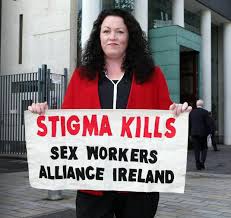|
Nevin Öztop is a young feminist activist from Turkey, currently based in Switzerland, and deeply interested and committed to queer rights, sex workers rights and mobilizing resources for marginalised communities. She works as a Senior Resource Mobilization Officer at FRIDA | The Young Feminist Fund, the only youth-led feminist fund that supports young feminist organizing worldwide, including funding for groups working on advancing the human rights of sex work, among other issues and causes. To learn more about FRIDA, follow them on Facebook, Twitter and Instagram. To make a contribution to FRIDA, follow this link. The debate around whether to decriminalise sex work or not is a highly misguided and morally charged conversation. One of the major debates on this issue broke out back in 2015 when Amnesty International created a draft policy suggesting that the entire sex industry should be decriminalised. By doing this, the policy went further than what is known as the “Nordic model”, a legal framework that has been adopted in several countries and has been described by some as “progressive”, and even feminist. This lead to celebrities including Emma Thompson, Kate Winslet, Meryl Streep, Emily Blunt, Lena Dunham, Anne Hathaway and Lisa Kudrow signing an open petition against the document. Two years later, the debate continues to be highly misguided and lacks a human rights based approach that is filtered from moral and populist discourse. The only thing that criminalization of sex workers and consumers do is further criminalise the lives of sex workers and stopping them from accessing their fundamental rights such as health, housing, and safety. What is sex work and how is it criminalized? Sex workers are adults who receive money or other forms of compensation in exchange for consensual sexual services, either regularly or occasionally. A sex worker can be female, male, or trans* person. But even today, in most countries around the world, sex work and activities associated with it are criminal acts. Criminalization of sex workers come in many forms and names. Arrest, prosecution, and harassment are part of the daily life or sex workers because of laws that criminalize purchase of sexual services. Even non-offensive acts such loitering, vagrancy, and impeding the flow of traffic can invite severe punishments. In most countries, even those where sex work is legal, sex workers are stigmatized and marginalized, which may prevent them from seeking legal redress for discrimination. All that laws criminalizing sex workers and consumers do is further put sex workers in danger, impeding their ability to seek protection from violence and obtain needed housing, labour and health services. Here are five reasons why our only option to protect and safeguard sex workers is decriminalization: 1. Criminalisation creates fertile ground for police violence and arbitrary detentionsPolice often use vaguely worded laws and regulations prohibiting such as “loitering” and “loitering with intent to solicit,” as well as “obstructing vehicular traffic,” “public lewdness,” “public nuisance,”, “disorderly conduct,”, and “acting against public morality” to harass, detain, and arrest sex workers. These petty offences are used because sex work is criminalised (in some cases) or because the State believes it should be. (in some countries, sex work is an administrative and not a criminal offence). Sex workers of color, and particularly transgender sex workers of color, are often perceived by police through racialized and gendered stereotypes framing them as highly sexualized and sexually available. Law enforcement officers’ internalization and perpetuation of these stereotypes, combined with criminalization and the high degree of discretion afforded by vague “quality of life” regulations, results in police profiling sex workers, and selective targeting for harassment, arbitrary detention, and arrest. Additionally, criminalization of sex work leaves them open to further stigmatization and abuse by state actors themselves. Sex workers often experience sexual assault and rape, are threatened to be “outed” to their families as sex workers, or released from arrest in exchange for sexual services. Criminalization of sex work creates fertile ground to these kinds of abuses by state actors because, if sex workers report these crimes, there is the reality that they will be arrested themselves as criminals. 2. Criminalisation exposes sex workers to severe violations of labor rights Abolitionist laws and regulations are harmful and ineffective, and push sex workers into insecure and unsafe working conditions. In most countries, sex work is still invisible work, with no or little access to labour rights, employment benefits, fair wages and clean and secure working environments. Also, in many countries access to social security and retirement benefits and health insurance are tied to work in the formal economic sector. All informal workers -including sex workers- are thus excluded from these benefits. According to the International Union of Sex Workers, all sex workers should have the right to: ● access the full range of employment, contract and property laws, ● participate in and leave the sex industry without stigma, ● full and voluntary access to non-discriminatory health checks and medical advice 3. Decriminalisation improves health and well-being of sex workersSex work is also a major public health problem. It has many faces, but ill mental health of sex workers is primarily related to different forms of violence and social stigma. Funders and governments must address these structural barriers and ensure sex workers’ human rights as well as implementing a comprehensive package of HIV and health services for sex workers through community led approaches. Some Sex workers are vulnerable to using addictive drugs, having unprotected sex, sexual assault and violence. Rape and violence are all common risks faced by sex workers in many different occupations. HIV affects large numbers of sex workers who engage in sex work, of all genders. Globally, female sex workers are 13.5% more likely to be living with HIV than other women of reproductive age; in Asia, female sex workers are almost 30% more likely to be living with HIV. Decriminalising sex work could lead to a 46% reduction in new HIV infections in sex workers over 10 years; eliminating sexual violence against sex workers could lead to a 20% reduction in new HIV infections, according to a WHO report. Often sex without protection is a direct result of the power that sex workers lack. This leads to the inability to negotiate safer sex practices with clients, rendering them vulnerable to the threats of unprotected sex. For refusing to not use protection, sex workers often face blackmailing and threats to be reported to authorities or experience violence. This also means this sort of crime goes unpunished because there is little efforts and resources put into chasing violence against sex workers as they are seen as criminals in the first place. With the decriminalisation of sex work, sex workers can be supported by their states to take measures to keep themselves and their families safe from violence and sexually transmitted illnesses. 4. Decriminalisation increases access to legal system Sex workers face a range of human rights violations on a daily basis, from rape to threats, blackmailing, violence, arrests, being denied services at hospitals and police stations, harassment, to even murders. Laws that criminalise sex work result in sex workers feeling unsafe reporting crimes -including violent crimes and other abuses- because they fear prosecution, police surveillance, stigma, and discrimination. Today, it is still very difficult for a sex worker to come forward to seek justice. It is not only difficult for sex workers to simply get their day in court, but there are also many other systemic barriers for sex workers who want to engage the legal system to assert their rights. Decriminalisation would bring an important shift towards access to justice for all sex workers. For example, the passing of the Prostitution Reform Act followed years of work by New Zealand’s sex-worker organisation, the New Zealand Prostitutes Collective. Its purpose was to minimise harm, and so the law change not only removed legislation that criminalized sex work, but also afforded new rights to sex workers. Decriminalisation in New Zealand differs from legalised regimes, such as that in Germany, since it focuses on empowering sex workers themselves, rather than the state, to have greater control over their work. This approach recognises that sex workers are the best people to advise on their own working conditions. According to a recent study in New Zealand, more than 60% of the 772 sex workers who participated reported feeling more able to refuse to see certain clients, and 95% said they felt they had rights after decriminalisation. These rights mean the balance of power has shifted: Sex workers can more easily hold to account those who seek to exploit them. 5. Because sex workers have a right to dignified and respected life! Sex workers are paid to engage in sex acts or sexually explicit behavior for a wide range of reasons: sometimes it is because it offers flexible working hours and conditions, sometimes it is temporary income, sometimes their survival depends on that income. Regardless of the reason one gets into this profession, sex workers have the right to fully enjoy access to justice, health, shelter, education and other social services and live without the fear of discrimination, violence, threats and arrests. In a world where sex work is no longer criminalized, sex workers can benefit from the justice system to seek redress for discrimination and abuse and live in humane conditions and with dignity. In times of hate and violence, organizations and individuals that work to end stigmatization, incarceration and social punishment of sex workers not only become the target of attacks and exclusion but also rely on scarce financial and non-financial resources to continue their vital fight to bring social justice to their communities. Supporting and funding the social justice movements led by sex workers is our only option because decriminalization sex work is intertwined with recognizing it as work and protecting the rights of sex workers through labor and social laws, and ensuring the workplace and working conditions meet health and safety standards and regulations. Nevin Öztop is a young feminist activist from Turkey, currently based in Switzerland, and deeply interested and committed to queer rights, sex workers rights and mobilizing resources for marginalised communities. She works as a Senior Resource Mobilization Officer at FRIDA | The Young Feminist Fund, a youth-led feminist fund that supports young feminist organizing worldwide, including funding for groups working on advancing the human rights of sex work, among other issues and causes.
1 Comment
|
Sex
|
 RSS Feed
RSS Feed